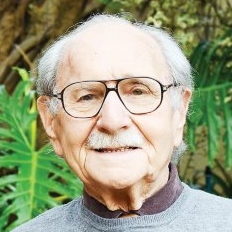
News

This 94-year-old educator tackles masters degree
JORDAN MOSHE
But then, Kahanovitz is not your typical nonagenarian.
His career as an educator has spanned the better part of the 20th century, during which time he helped to establish King David Linksfield.
Whereas others his age might spend their retirement playing golf, he has committed to furthering his education. “Much of my retirement has been dedicated to various projects,” he says. “The last ended 18 months ago. I had to fill this gap, and decided to return to study. I chose history, my favourite subject, as I was struck by how few pupils pursue history in the upper grades.”
The passion for learning has run in Kahanovitz’s blood for decades. Born in Johannesburg in 1925, his family moved to Newcastle when he was a year old. He was sent to Hillel College in Johannesburg as a boarder for two years before enrolling at Jeppe Boys. After earning a BA in history at what is now the University of KwaZulu-Natal, he began his journey into the realm of education as a career.
Says Kahanovitz, “My teaching career started in 1948 after graduating. I was appointed to a school in Durban for two and a half years, serving as master of the boarding house and the cricket coach.
“In 1950, a member of the newly constructed South African Board of Jewish Education [SABJE] in Johannesburg met to tell me of plans to build a Jewish school. The challenge was irresistible, and, together with Ike Harris, we started King David Primary School in Linksfield in 1951. I was in my early 20s at the time.”
He says the school had about 30 students from grades one to six, with him teaching history to the older students. “Our project was to build up the school, and await the arrival of Abe Lipschitz to take over as the headmaster in 1953,” he says.
“It was tremendously challenging. We used an old bus that travelled all over to pick up pupils. Invariably, it was a problem. I had to ring up the city councillor to arrange a city bus. Our staff was also very small, but by the end of the year, we had a flourishing school.”
By the time Lipschitz came, the school had grown to include more grades, and Kahanovitz was appointed vice-principal. After serving for two years, he decided to spend time abroad, visiting Israel and London to conduct research and travel.
But, he was soon called back to continue developing Jewish education in the country.
“While I was in England, Rabbi Isaac Goss sent me a letter to ask if I knew someone [who could] start a high school,” he recalls. “I recommended my good friend Norman Sandler. He called me back from Israel, and together we built up the high school which, in a short while, became overcrowded.”
Together, the pair drove the school forward, investing in it an emphasis on Hebrew and Jewish identity.
Though they tried to model it on the school system in the United Kingdom, it didn’t always go according to plan. “Norman and I thought in our first year that part of the uniform should be a straw basher hat,” laughs Kahanovitz. “Hell, that was a mistake. What only happened at prayers in the morning when the students decided to throw them around…”
Kahanovitz remained at the school until 1959, moving to Durban to assist with founding yet another Jewish school, Carmel College. He recounts, “We started with a few children in 1960, and by 1966, we had our first matric class. We built a thriving high school, and always had excellent results.”
Kahanovitz also received his degree in education during this time. He then moved on to take up a position as principal of Carmel School, Pretoria, serving there for 13 years before retiring at the age of 60.
Kahanovitz spent some time working at Punt Gesels radio, and at his nephew, Selwyn Kahanovitz’s, business, but he kept returning to work in education. From 1991, he lent his expertise to various educational projects in South Africa, including a technical college in the Eastern Cape.
He did so until quite recently, when he decided to take up a masters degree in history a few weeks ago. “I would have preferred to play golf,” he says, “but don’t have the money for that. What else could I do? I chose a masters.”
Kahanovitz resolved to do the dissertation degree at the University of South Africa by correspondence. He has spent the past few weeks reimmersing himself in historical literature and the material he studied in his BA, and is currently choosing a research topic. He believes it will probably be concerned with Jewish history.
“Jews are too often victims of false historical accounts and accusations,” he says. “I want to do research to challenge this. The acceptance of lies speaks for deep ignorance amongst many nowadays, and this needs to be confronted.”
He laments that in general, history is a sadly neglected subject in South Africa, and an area from which much can be learned, especially by Jews. “We have survived because of what we have learned from our past,” he says. “Without history, we have no foundation that allows us to understand why we have Israel or who we are as Jews.
“Jews must be knowledgeable in general, and Jewish education must remain a priority. So many Jewish minds have been recognised for their contributions to history. We must continue to invest in education.”





Robert Levy
June 20, 2019 at 10:18 am
‘Isidore Kahanowitz taught us history in matric at King David High in 1960. A brilliant teacher – he made it come alive! I always remember he walked around the classroom swinging a cricket bat – if you didn’t duck, you got klapped!
I wish him all the best!
‘